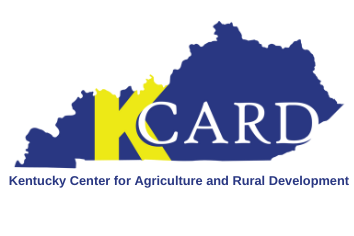KCARD’s Local Food Project Coordinator Olivia Vogel talks broken supply chains and the role of Kentucky farms to meet the needs of Kentuckians in this post.
Last week, a colleague told me that a major food distributor warned restaurants that deliveries would be unreliable and infrequent due to hiccups in the supply chain moving food from the western US to Kentucky. On August 22nd, The Wall Street Journal ran the article “You Can’t Find Everything You Want at Grocery Stores.” When discussing this with a friend, they asked me if anyone is measuring the percentage of food that Kentucky farmers grow for Kentuckians? In other words, what percentage of the foods that we eat do we grow or produce within our state?
That got me thinking, how would we even get close to this calculation? The Census of Agriculture asks farms about food marketing practices, including (1) food sold directly to consumers and (2) food sold directly to retail markets, institutions, and food hubs for local or regionally branded products. The data includes the number of farms, the value of sales, and the average sales per farm. It can be pulled as a US total, a Kentucky total, and even county total. Find your county here, starting on page 302. I’ve included the numbers for Kentucky from the 2017 Ag Census below.
The data reveals that 5% of Kentucky farms sell food directly to consumers and less than 1% sell food to retail markets, institutions, and food hubs. The total sales for both categories together account for less than 1% of total Kentucky agriculture sales.
Certainly, the Ag Census is under-representative of the true food economy; it does not include home gardens or food manufacturing, such as the Pop-Tarts in Pikeville, Honey Buns in London, or Jif peanut butter in Lexington. Also, a lot of Kentucky feeder calves, soybeans, milk, wheat, etc. do eventually make it back into our food chain after being processed out-of-state. Additionally, larger outfits such as Winchester Dairy Farms (Kroger) aren’t represented in the data above. These entities play an important role in feeding Kentuckians too.
Conservative as they may be, do these numbers surprise you? When I talked with my grandmother back in 2015 about the role of food self-sufficiency in the wake of a crisis, she seemed cool and collected when she replied, “Oh honey, if people had to grow their own food, they’d figure it out in a heartbeat.” She was raised in an agrarian community where most people were involved in food production. While I appreciate her hopeful perspective, after the COVID gardens of 2020 that were neglected by the end of summer, I’m just not so sure anymore. I think it’s as important as ever to support farmers with years of experience in food production.
There are certain benefits of the local food economy that we all agree on. Investment in the local food economy should be considered for the sake of community development, jobs, and food security, in addition to potential human and environmental health benefits. When a Kentucky farmer raises and processes finished beef at a Kentucky USDA-inspected facility, the impact ripples across the local economy. Jobs are created and sustained from the farm to the processor and all the local business supported in between. Think farm help, construction, equipment maintenance, marketing, website design, packaging, delivery, sales, customer service, and so much more. KCARD has seen this over the years as the clients we’ve worked with have grown and expanded.
Kentucky local food farms and processors will grow in response to sustained demand from Kentucky eaters in every sector, and KCARD will be there to help them through the growing pains of business expansion. From individual households, restaurants, schools, institutional cafeterias, and more, there is room to support Kentucky’s local food economy. Even small steps are meaningful and impactful. Reach out to KCARD’s Local Food Project Coordinator today if you would like some assistance sourcing Kentucky local foods.


